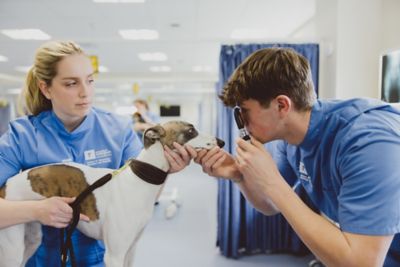*For full details including fees for part-time students and reduced fees during your time studying abroad or on placement (where applicable), see our fees page.
If you are a student from the EU, EEA or Switzerland, you may be asked to complete a fee status questionnaire and your answers will be assessed using guidance issued by the UK Council for International Student Affairs (UKCISA) .
Additional costs
You should factor in additional costs into your budget, alongside your tuition fees and living expenses.
The additional costs cover essential items you will need for the course such as:
Health and safety equipment
Compulsory branded and named protective clothing and equipment including:
- boiler suit
- digital thermometer
- waterproof jacket and trousers
- parlour top
- small animal handling tunic
- stethoscope clogs and scrubs (required in your final year)
Total costs for these items are approximately £300. Our vet school shop sells all items at a low cost. A complete list will be provided following your successful application.
Extra mural studies (EMS)
Undertaking EMS also incurs extra costs, but these are dependent on the location of your chosen placements in terms of travel and accommodation.
Students choose the location of EMS, so you might be able to undertake most of your EMS from your home - helping reduce these additional costs.
Final year placements
In addition, extra costs will be incurred in your final year placements.
Accommodation is provided at some rotations but there will be extra travel costs.
The school currently provides a travel allowance to help towards these costs which are paid directly into your bank account, to assist with these costs.
Other items
You should be able to access most of the books you will need through our libraries, though you may wish to purchase your own copies either through our vet school shop or second-hand. Please note that figures are approximate and subject to change.
Scholarships and bursaries
School of Veterinary Medicine and Science International Student Scholarships
These scholarships will be awarded to the students who perform best overall in the school's admissions process and will be designated when offers for places are made. The scholarship offers a 10% reduction in fees for each of the five years of undergraduate study. This scholarship is open to all applicants classified as 'overseas' for fees purposes.
International students
We offer a range of international undergraduate scholarships for high-achieving international scholars who can put their Nottingham degree to great use in their careers.
International scholarships
Tuition fees 2026/27 (UK undergraduate students)
This is the UK undergraduate tuition fee for the academic year 25/26. It may increase for the academic year 26/27 and we will update our information once we have received confirmation of the fee from the UK Government.
*For full details including fees for part-time students and reduced fees during your time studying abroad or on placement (where applicable), see our fees page.
If you are a student from the EU, EEA or Switzerland, you may be asked to complete a fee status questionnaire and your answers will be assessed using guidance issued by the UK Council for International Student Affairs (UKCISA) .
Additional costs
You should factor in additional costs into your budget, alongside your tuition fees and living expenses.
The additional costs cover essential items you will need for the course such as:
Health and safety equipment
Compulsory branded and named protective clothing and equipment including:
- boiler suit
- digital thermometer
- waterproof jacket and trousers
- parlour top
- small animal handling tunic
- stethoscope clogs and scrubs (required in your final year)
Total costs for these items are approximately £300. Our vet school shop sells all items at a low cost. A complete list will be provided following your successful application.
Extra mural studies (EMS)
Undertaking EMS also incurs extra costs, but these are dependent on the location of your chosen placements in terms of travel and accommodation.
Students choose the location of EMS, so you might be able to undertake most of your EMS from your home - helping reduce these additional costs.
Final year placements
In addition, extra costs will be incurred in your final year placements.
Accommodation is provided at some rotations but there will be extra travel costs.
The school currently provides a travel allowance to help towards these costs which are paid directly into your bank account, to assist with these costs.
Other items
You should be able to access most of the books you will need through our libraries, though you may wish to purchase your own copies either through our vet school shop or second-hand. Please note that figures are approximate and subject to change.
Scholarships and bursaries
School of Veterinary Medicine and Science International Student Scholarships
These scholarships will be awarded to the students who perform best overall in the school's admissions process and will be designated when offers for places are made. The scholarship offers a 10% reduction in fees for each of the five years of undergraduate study. This scholarship is open to all applicants classified as 'overseas' for fees purposes.
Home students*
Over one third of our UK students receive our means-tested core bursary, worth up to £1,000 a year. Full details can be found on our financial support pages.
* A 'home' student is one who meets certain UK residence criteria. These are the same criteria as apply to eligibility for home funding from Student Finance.







